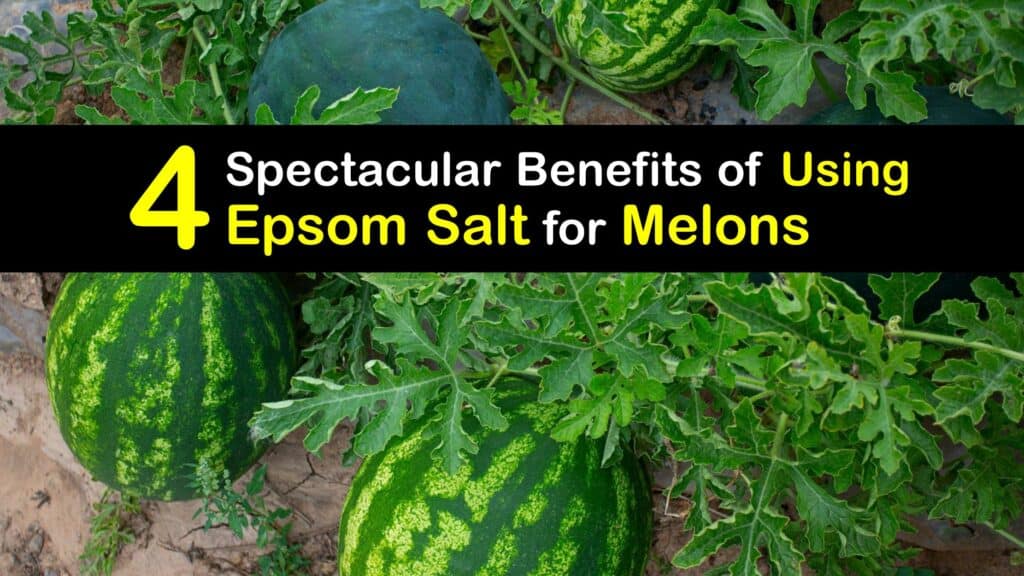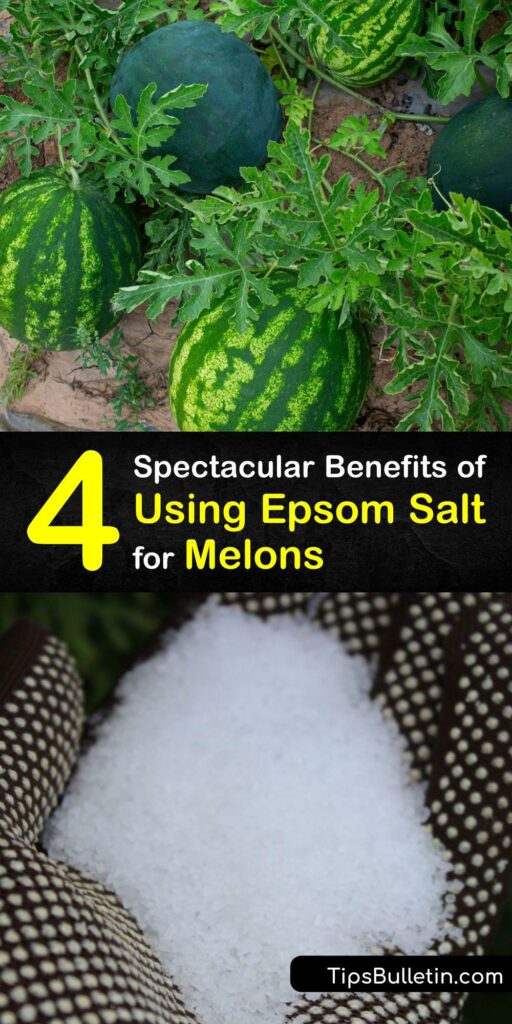Growers often use Epsom salt for melons to raise the quality of their crops. Epsom salts are commonly associated with bath salt used to soothe tight muscles and promote relaxation. These tiny white crystals are magnesium sulfate, a valuable chemical structure with much to offer in the garden.
Is Epsom salt good for melons? There are several benefits of Epsom salt for melon plants. Melons grow on vines with both a female flower and a male flower. The health of the melon vine is vital for producing a sweet, high-quality crop of enormous melons. Epsom salt acts as a fertilizer to provide extra nutrition to encourage growth and fruit production.
These crystals deter pests like slugs and fungal diseases like powdery mildew from your plants. Epsom salt treats these issues if they become a problem and even causes your plant to yield sweeter fruits. Save money on commercial products and use Epsom salts as an economical fertilizer, pesticide, sweetener, and more.

How to Use Epsom Salt for Melon Plants
If you’re preparing to grow watermelon from seed or want to support your mature crop, it’s worth learning about using Epsom salt for melons. Many organic gardeners want to know, “Is Epsom salt good for melons?” Epsom salt is great for melons and serves many purposes, from pest control and fertilizer to preventing mealy, flavorless melons.

Is Epsom Salt Good for Melons?
Is Epsom salt good for melon plants? Magnesium sulfate, a nutrient necessary for melons throughout the growing season, is in high concentrations in Epsom salts. Your melon plant and other fruits don’t grow well without enough magnesium.
Epsom salts benefit your melon plants by increasing magnesium levels, encouraging a rich flavor and flower development, helping with pest and disease management, and more.
According to the National Gardening Association, Epsom salts are the best way to treat a magnesium deficit. Introducing Epsom salt to the soil corrects low magnesium, whether you recognize the symptoms of yellowing leaves and fewer individual melons or find insufficient magnesium on a soil test.
Epsom salts are slightly acidic, so they foster a lower soil pH; they’re ideal for plants preferring acidic soil, like tomato plants and melon plants.
Epsom Salt for Melons – Organic Fertilizer
Calcium, magnesium, nitrogen, and potassium are part of the nutrient profile required by a watermelon plant throughout the growing season. You’ll be ready to harvest watermelons when the skin is bright green and the inside sounds hollow. Without these nutrients, the watermelons might not reach this stage.
Epsom salts are a great magnesium based fertilizer to promote growth and keep your melon vine healthy and productive. Apply Epsom salts in a soil drench for a simple way to fertilize melons and encourage larger and more abundant watermelon fruit.
Shake the salt and water in a sprayer and use in place of regular watering to keep the soil moist for healthy watermelon vines. In a smaller yard, you can grow melons in raised planters. A soil drench is necessary in planters to maintain the moisture level.
How to Use Epsom Salt for Melons
If you’re struggling with tasteless melons, Epsom salts provide a simple answer. Fruit tastes best when it’s grown on a vine in peak health. Epsom salts improve the flavor of melons by providing essential nutrients, deterring pests, and maintaining soil pH, so your watermelon plant yields the highest quality fruits.
Shake the salt and water well and spray or pour around the bases of watermelon plants for tastier fruit. Epsom salts make sweeter watermelons and help pepper plants and gardeners who grow tomatoes achieve better taste.
Pest Control – Epsom Salt and Melons
Pests might pose an issue whether you grow cantaloupe or watermelon. Epsom salts are a solution when a fungal disease like blossom end rot and powdery mildew or insect pests like slugs and snails plague your melon or tomato plant.
Chemical pesticides introduce toxic chemicals into your garden and make the fruit you produce non-organic. Epsom salt contains no harmful substances and is appropriate for organic gardens.
Mix one cup of unscented Epsom salts and five gallons of water in a garden sprayer. Treat the leaves of your melon plants to prevent or remove pests from your growing watermelon.
The applications of Epsom salt for melon plants are many. Though typically considered a bath salt and muscle relaxer, Epsom salts, or magnesium sulfate, is extremely useful in the garden. If you practice organic gardening, want to save money, or prefer to use simple products in your home garden, use Epsom salts to ensure melon growing success.

If you liked this article about Epsom salt for melons, please share these brilliant tips on using Epsom salt for melon plants with your friends and family on Pinterest and Facebook.